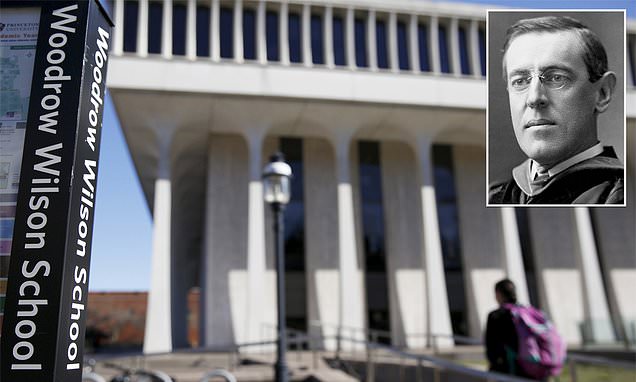President Woodrow Wilson’s name will be removed by Princeton
Princeton has stripped the name of 28th President Woodrow Wilson from a college and public policy school due to his ‘racist thinking.’
Princeton University President Christopher Eisgruber announced on Saturday the institution will remove Wilson’s name from its public policy school and a residential college.
‘On my recommendation, the board voted to change the names of both the School of Public and International Affairs and Wilson College,’ Eisgruber said in a statement.
He added: ‘the trustees concluded that Woodrow Wilson’s racist thinking and policies make him an inappropriate namesake for a school or college whose scholars, students, and alumni must stand firmly against racism in all its forms.’
Princeton University’s president announced Saturday the institution will remove President Woodrow Wilson’s name from its public policy school (above) and a residential college
Wilson served as president from 1913 to 1921, during the period following Reconstruction that is known as the nadir of American race relations.
A Democrat, he oversaw progressive policies and led the nation in World War I, as well as establishing the UN-precursor League of Nations.
He was also the first southerner to be elected president after the Civil War, and oversaw the segregation of the federal government.
In a July 1913 letter to a civil rights activist, Wilson defended the segregation of government offices, arguing that it removed ‘friction’ between the races.
Famously during Wilson’s presidency, D. W. Griffith’s film The Birth of a Nation, which celebrated the rise of the Ku Klux Klan, was the first motion picture to be screened in the White House.
The film also quotes Wilson’s historical scholarship on the KKK, but after seeing it Wilson disavowed the movie, saying he had been ‘unaware of the character of the play before it was presented.’
Wilson as a Princeton alumnus and later served as president of the university. He is seen above, holding his hat, as an undergraduate with the Princeton University ‘Alligator Club’
Wilson had deep ties to Princeton, where he studied as an undergraduate, and later became president of the university before going on to become the governor of New Jersey and U.S. president.
In 2016, Princeton’s board rejected activist demands to remove Wilson’s name. opting instead to take steps to highlight troublesome aspects of his administration.
Eisgruber cited the deaths of George Floyd, Breonna Taylor, Ahmaud Arbery, and Rayshard Brooks as the reason for reconsidering the move. All were black people who died in encounters with police or civilians.
‘This searing moment in American history has made clear that Wilson’s racism disqualifies him’ as a role model, he said.
‘Wilson’s racism was significant and consequential even by the standards of his own time,’ Eisgruber said, adding that the former president’s segregationist policies ‘make him an especially inappropriate namesake for a public policy school.’
Princeton’s public policy school will now be known as the Princeton School of Public and International Affairs, Eisgruber said.
Princeton had already planned to close Wilson College and retire its name after opening two new residential colleges currently under construction but will change the name to First College immediately.
Candid photograph of Woodrow Wilson, sitting at roll-top desk at Princeton University, 1909
Eisgruber said the conclusions ‘may seem harsh to some’ since Wilson is credited with having ‘remade Princeton, converting it from a sleepy college into a great research university,’ and he went on to become president and receive a Nobel Prize.
But while Princeton honored Wilson despite or perhaps even in ignorance of his views, that is part of the problem, Eisgruber said.
‘Princeton is part of an America that has too often disregarded, ignored, or excused racism, allowing the persistence of systems that discriminate against Black people,’ he said.
Four years ago, a 10-member committee gathered input from Wilson scholars and more than 600 submissions from alumni, faculty and the public before concluding that Wilson´s accomplishments merited commemoration, so long as his faults were also candidly recognized.
The committee report also said using his name ‘implies no endorsement of views and actions that conflict with the values and aspirations of our times.’
Earlier in the week, Monmouth University of New Jersey removed Wilson´s name from one of its most prominent buildings, citing efforts to increase diversity and inclusiveness.
The superintendent of the Camden school district also announced plans to rename Woodrow Wilson High School, one of the district’s two high schools.
Woodrow Wilson’s troubled history with race and segregation
Wilson was the 28th US president
Wilson served as president from 1913 to 1921, during the period following Reconstruction that is known as the nadir of American race relations.
A Democrat, he oversaw progressive policies and led the nation in World War I, as well as establishing the UN-precursor League of Nations.
His domestic agenda included the implementation of federal income tax and the creation of the Federal Reserve.
He was also the first southerner to be elected president after the Civil War, and oversaw the segregation of parts of the federal government.
While Wilson did not mandate the segregation of the entire government, he allowed Cabinet members to segregate their respective departments.
In a July 1913 letter to a civil rights activist, Wilson defended the segregation of government offices, arguing that it removed ‘friction’ between the races.
Famously during Wilson’s presidency, D. W. Griffith’s film The Birth of a Nation, which celebrated the rise of the Ku Klux Klan, was the first motion picture to be screened in the White House.
The film also quotes Wilson’s historical scholarship on the KKK, but after seeing it Wilson disavowed the movie, saying he had been ‘unaware of the character of the play before it was presented.’






